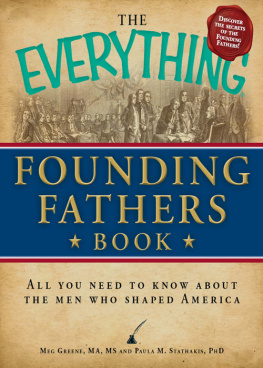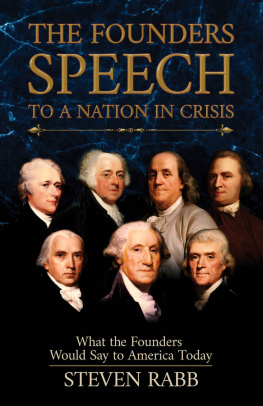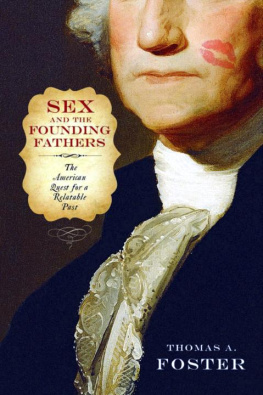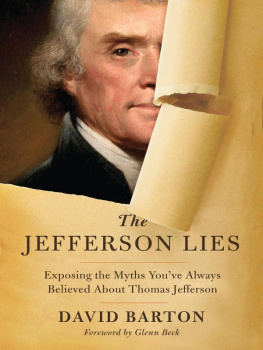For Connie
PREFACE
A merican politics has its share of odd symbols, practices, and orthodoxies, but surely the most peculiar is the constant reference to the nations Founders in contemporary debate. Everyone cites the Founders. Constitutional originalists consult the Founders papers to decide original meaning. Proponents of a living and evolving Constitution turn to the Founders as the font of ideas that have grown over time. Conservatives view the Founders as architects of a free enterprise system that built American greatness. The more liberal-leaning, following their sixties parents, claim the Founders as egalitarians, suspicious of concentrations of wealth. Independents look to the Founders to break the logjam of partisan brinksmanship. Across the political spectrum, Americans ground their views in a supposed set of ideas that emerged in the eighteenth century.
But, in fact, the Founders disagreed with each other. They agreed to separate from Great Britain, and they agreed after much compromise, at least some of them, on the text of the Constitution. But beyond that, they had vast and profound differences. They argued over federal intervention in the economy and about foreign policy. They fought bitterly over how much authority rested with the executive branch, about the relationship and prerogatives of federal and state government. The Constitution provided a nearly limitless theater of argument. The founding era was, in reality, one of the most partisan periods of American history.
How is it, then, in contemporary debate that conservatives, liberals, and libertarians cite these argumentative Founders as though they would all naturally support policies in the present? How did a bitterly divided generation become a cohesive group of visionaries?
It has been a pattern of long standing. From the early disputes about the role of the federal government in nation building, to the conflict over slavery and the Civil War, the debates over the New Deal during the Great Depression, the civil rights movement of the 1950s and 1960s, and the Reagan Revolution of the 1980s, everyone has called on the Founding Fathers. Todays Tea Party continues a habit common from the beginning of American political debate.
What is the result?
Founders talk degrades debate. It encourages intellectual dishonesty. It is both easy and destructive. The Founders words and thoughts become weapons. Discussion of policy becomes ideological combat. If you disagree, you betray principle. Ultimately, citations from the Founders become partisan propaganda. In 1984, George Orwell wrote: Who controls the past controls the future; who controls the present controls the past. So it has been for much of American history, as successive generations of politicians impose their own meaning on the Founders.
Lets take up that history beginning with the Founders themselves, when Thomas Jefferson won the first round of debate and set the pattern for all succeeding ones.
CHAPTER ONE
The Quest for Unanimity
G eorge Washington probably should have known better. In 1789, just after taking office, he faced a choice that would turn out to shape his two terms as president. The Constitution had been drafted nearly a year and a half earlier. After a bruising battle over its ratification, in which many people objected to what they saw as the Constitutions centralization of authority, Washington had been unanimously elected as the nations first president. The moment was delicate. Everyone trusted in Washington as a leader, but not everyone trusted one another. And not everyone trusted in the government created by the Constitution.
As Washington assumed the seat that many thought had been made for him, he needed to reassure concerned citizens that all was well. So he used his first inaugural to smooth over anxiety about the new government. It would be a force for national prosperity and national good, he promised. He would not allow the government to become despotic or to aid one section of the country over another. No local prejudices or attachments, no separate views nor party animosities, will misdirect the comprehensive
But he also needed to use the new national powers of the government to confront the various and multiple problems that the nation faced. And he needed to appoint people to his cabinet who would use these new powers in a vigorous but politically circumspect manner. They would have to wield the new executive authority provided to the government without antagonizing those who had objected to the Constitution.
In that quest he did not hesitate, at least initially, to think big. His first appointment was Alexander Hamilton, for Treasury. The United States faced a number of economic problems that had been around since the end of the Revolutionary War. Under the Articles of Confederationthe wartime government that the Constitution replacedthe United States had been unable to coordinate the economic activity of the states. The nation, as a result, had no coherent program of economic development. And it struggled under debt from fighting the Revolution. If the United States was going to be successful as a nation, it would need to address its large debt, establish its credit in the eyes of other nations, and raise the capital to engage in still necessary national improvements.
Hamilton was perfect for that task. He was one of the most brilliant minds of the new nation, and he had a clear conception of the economic problems. But he also had a particularly clear vision of national power that was bound to antagonize those who feared a strong central government. More than anyone else among the founding generation, Hamilton believed that the new constitution provided, in his words, streams of national power that needed to be channeled to specific ends. Power was, for Hamilton, a good thing. Those who worried about strong governmental power, according to Hamilton, missed the more dangerous
Such a view was at total odds with Washingtons choice for secretary of state, Thomas Jefferson. It was here that Washington made his first mistake. State was also a vital cabinet position. Following the Revolution, several aspects of foreign relations needed attention. And because many future treaties would deal with commercial relations, some overlap in Hamiltons and Jeffersons respective portfolios was inevitable. The overlap would not have been a problem had they been in general philosophical agreement. But because Jefferson and Hamilton could not disagree more vehemently on any number of issues, conflict was also inevitable.
Jefferson had, in fact, long been uncomfortable with the Constitution. Though he did not have a hand in drafting ithe was away in Paris during the entire debatewhen he first heard the plan he complained to his friend James Madison, Prim facie I do not like it. It fails in an essential character, that the hole and the patch should be commensurate. But this proposes to mend a small hole by covering the whole garment. Jefferson would have preferred to live under the Articles with perhaps a few amendments. I own I am not a friend to a very energetic government, he acknowledged. And though he eventually made peace with the
Jeffersons commitment to liberty, as he understood it, was bound to cause problems when he was paired with Alexander Hamilton, a man also not shy about his opinions. But Washington did not see the potential for conflict. In spite of the raucous debates that the nation had endured during the ratification process, Washington assumedlike many in his timethat any fair-minded gentleman politician would arrive at basically the same place as any other fair-minded gentleman politician, so long as they were both republican in outlook. He did not believe that two republican gentlemen could disagree on principle without one of them suffering from a fatal flaw in character. He thought that if he chose what he called first charactersthose who made up the natural aristocracy of the United States and could be trusted to lead the nationhe would not need to scrutinize their views too closely.







